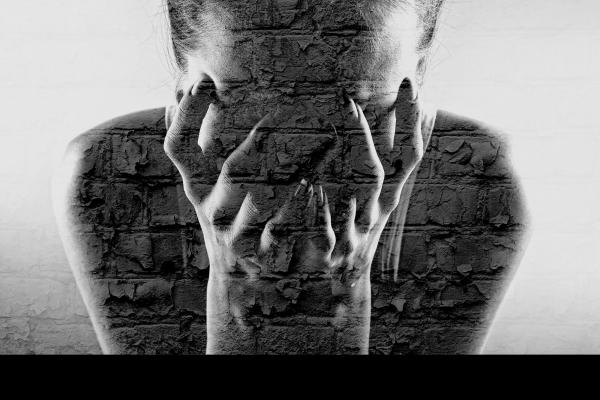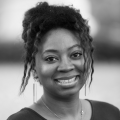Halloween has passed and people are still scared out of their minds. The ghoulish costumes, haunted houses, and spirits, just don’t compare to the future of this country set to unfold over the next few days. Separatism, sexual assault, and scandal have set the stage. The anxiety of what is to come is chilling. I see it everywhere.
The other day I stood at a train stop, waiting to be shuttled to work like thousands of other Washington metro residents. A man, a black man, passed by the stop on his bike. He was standing on the foot pedals as he rode by, earbuds in, loudly yelling lyrics to some song. Just as he passed a young white man walking up to the track motioned at the man with his hands and shouted, “BOO.” It was a very random display for 7 a.m. and obviously startled many people. As they silently gathered themselves and continued to the stop, they were greeted by the scene of a police officer and squad car with the lights flashing. Apparently, the officer was at the train stop “just for extra safety measures.”
Many are bracing themselves for one of the most tumultuous presidential elections in recent history. Witnessing the black man on the bike at the train station made it clear to me that every American — in their own way — is living on the edge right now. You can feel the consensus of fright hanging in the air, the spirit of fear coloring our days. Blue vs. red. Black vs. white. Foreigner vs. national. Man vs. women. Us vs. them. The media only rallies this division.
Before I judged the black man at the train stop (I wish I knew his name) and wrote him off as just a “deranged, angry, scary” black man, I took a few minutes to think about and process the world we live in from his perspective. I imagined myself about 24 years old or younger, 5’10 with dark chocolate-brown skin, free-flowing 12-inch dreadlocks, and a muscular build. I imagined what it feels like to put on the news, pick up the newspaper, or scroll my Facebook timeline, only to hear a gun cock then watch blood spill out of black body just like mine. What does it feel like to know that news coverage exactly like this is trending and that every month there is a different black body, a different city, and a different hashtag notating a similar death? No justice. No accountability. No police or anyone to call for help. There’s no place to run.
Michael Brown, Eric Garner, Alton Sterling, Freddie Gray, Philando Castile, Terence Crutcher — the names keep coming. All I can think about is who’s next? Looking down at my pigmented arms and hands, I know the survey says I could easily be next. Placing myself in the black man’s plight, I felt terror real-time with nothing to do about it. It’s a living nightmare. This must be how the main characters of horror films feel when they decide locking themselves in an upstairs closet is a good idea with an axe-murderer on the loose in the house.
That black man riding by the train stop greeted the world just as it greeted him that morning — radiating a jolt of stomach-clenching, chilling, stark fear. He had a reason to be worried and uneasy, but he isn’t alone. Fear covers many.
Amid all the election rhetoric, fear covers undocumented men and women trying to live in a country where they can earn enough to provide for themselves.
Fear covers the family reliant on affordable healthcare to provide for their sick loved one.
Fear covers the concerned environmental activist watching the rising temperatures and record-breaking storms.
Fear covers the politically conservative distressed that their values will be squelched.
Fear covers white nationalists watching racial supremacy and embedded bigotry lose its social influence.
Everyone can pick an entry point to be afraid.
The last two elections welcomed “change” to America with Barack Obama, but what exactly does that mean for us now? Now that the first black president is leaving office, the general expectation is that America as a nation should be post-racial and accepting of the after-effects of marriage equality. The expectation is that America’s work is done and we are the good democratic, God-fearing, Christian nation our founding fathers idealized us to be. Or are we? Despite our strides, is anyone ready to admit there is still so much work to be done? It can feel overwhelming.
If Obama represented change toward a positive direction, how do we keep that momentum going? Well, the training wheels are off. It’s riding time and the fear of falling is real. The next question for people of faith becomes where is God’s presence in the midst of this? It’s important that we process this anxiety in healthy ways.
In 2 Timothy 1:7, the apostle Paul writes “For God hath not given us the spirit of fear; but of power, and of love, and of a sound mind.” (King James Version)
The most liberating factor for Christians should be getting beyond themselves and not focusing on their personal agendas, but on what will be best for the community at-large. If there are doubts about that, reference the model of Christ. Christ’s model of living was completely sacrificial. Therefore, you can’t — with integrity — call yourself a Christian without following Christ’s self-sacrificing model. What have you sacrificed of yourself in order to improve another person’s plight? The Kingdom of God will begin to manifest the moment that we move away from individualism and more toward community.
Regarding the heightened fright this election season, we should acknowledge not just our own fear but also the fear others are experiencing. We should strive to understand “other” points of view before we make rash judgments and react out of fear. In our search to process fear in healthy ways, we must realize simply transferring the emotion helps no one. The answer to restore peace lies in our ability to get back to community and work through our emotions together. No one wins as long as we stand alone in our pain.
I think back to the young man, perhaps pained, riding by on his bike scaring people. I wish we had a moment to let him know that he’s not alone. As a community, I wish we had a chance to stand together, share with each other, listen, and understand one another. I wish we could have diffused his spirit of fear and transformed it into love. It’s possible to manifest this wish with action. As a community, can we commit to create safe spaces of vulnerability to process fear? I refuse to believe we have to live in fear. God didn’t give us this gift of life just to live it afraid.
Got something to say about what you're reading? We value your feedback!

